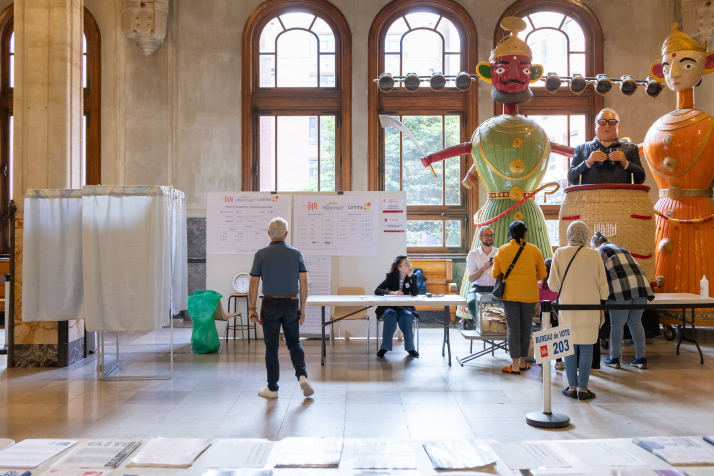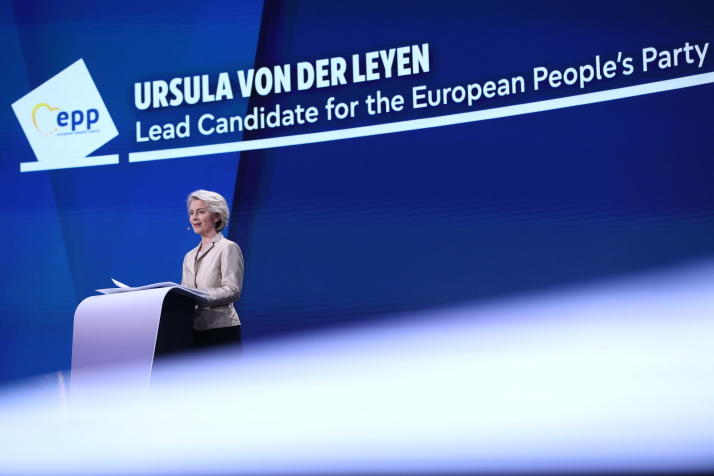| World |
| Where is the EU headed in the next five years? | |
|
|
 Voters cast their ballots in the European Parliament election at a polling station in Lille, France, on June 9 (XINHUA)
From June 6 to 9, voters from over two dozen European countries cast their ballots to elect lawmakers to the European Parliament for the next five years, with the largest political groups in the new European Parliament, the European Union's only directly elected institute, remaining those in the center-left and center-right. The EU is an economic and political union between 27 European countries. Roughly 370 million eligible voters chose 720 parliamentary members, 15 more than the 2019 election, from member states. But the results did reveal a shift to the right, with both center-right and far-right groups gaining more seats. This election outcome also delivered a domestic setback to the leaders of both France and Germany. Political analysts believe a three-group majority of the center-right European People's Party (EPP), center-left Progressive Alliance of Socialists and Democrats (S&N) and liberal Renew Europe (RE) will continue to steer EU policy, but the shift will bring more uncertainty to its policies on immigration, green transition and aids to Ukraine. With 13 of the 27 EU leaders being from parties that belong to the EPP, the results were good news for EPP member Ursula von der Leyen, who seeks a second five-year term as president of the European Commission. Retaining the majority National political parties form alliances across the continent to create larger parliamentary groupings based on shared values and policy proposals. The European Parliament is the EU's legislative, supervisory, budgetary and advisory body, with elections held every five years. Among the three major EU institutions—the European Council, the European Commission and the European Parliament—the parliament is the only body whose members are directly elected by ordinary voters. In the recent election, mainstream establishments lost seats but still retained a majority. The center-right EPP won 186 seats in the 720-member European Parliament, an increase of 10 seats from the previous term, and has been the leading party in every parliamentary election since 1999. The center-left S&N came in second, securing 135 seats, a decrease of four seats from the previous term; the centrist RE got 79 seats, a sharp reduction of 23 seats. Despite the reduction in seats from 417 in 2019 to 400, the three-group majority still constitutes 56 percent of the total. According to Xinhua News Agency, the center-right and center-left forces will continue to dominate the European Parliament and its policies, ensuring no unexpected shift in its political direction. When looking from a broader perspective, a comparison with the 2004 election reveals a clear swing. That year, the three major political forces held 556 out of 732 seats, accounting for a 76-percent majority. Zhou Deyu, a columnist for Shanghai-based news portal Guancha.cn, observed that the political space for the center-right, center-left and liberals has been shrinking over time. Despite these groups retaining a majority, their influence is at risk of further decline, potentially pushing them into the minority. Going right Notably, right-wing and far-right parties increased their seats, while center-left and liberal parties saw a reduction in their representation. The European Conservatives and Reformists Group (ECR), which includes Giorgia Meloni's Brothers of Italy and Poland's Law and Justice Party, secured 73 seats, gaining four additional seats; the Identity and Democracy Party (ID) won 58 seats, an increase of nine seats. "These groups are often seen as populist and far-right, with parties like Marine Le Pen's National Rally of France being affiliated with ID [at the European level]," said Zhou. Altogether, far-right seats now account for over 20 percent of the total seats. Jin Ling, a senior research fellow with and Director of the Department for European Studies under the China Institute of International Studies, explained that the rise of populist parties can be attributed to the COVID-19 pandemic, the Ukraine crisis and the Palestinian-Israeli conflict, which have worsened Europe's security situation, hindered economic recovery, and increased the cost of living. "Against this backdrop, issues including security, economy, immigration and the environment have become more prominent, with the public increasingly leaning toward protectionist sentiments," she said. In Germany, the far-right Alternative for Germany party (AfG) took second place with 15.9 percent of the vote—ahead of Chancellor Olaf Scholz's Social Democrats, who garnered 13.9 percent in their worst-ever result. In France, Le Pen's National Rally won more than 31 percent of the vote, defeating President Emmanuel Macron's centrist Renaissance party—which scored just 14.6 percent—and prompting his surprise move to dissolve the lower house of parliament and call a snap election—on June 30 for the first round and on July 7 for the second. The French constitution stipulates that the president has the power to dissolve parliament. An analysis by French newspaper Le Monde on the election results pointed out that this reflects a "crisis of confidence" for the ruling party of the public. And Macron's shock decision does offer the increasingly popular far-right a real shot at power. Amounting to a roll of the dice on his political future, this immediately sent the euro down, while French stocks and government bonds tumbled, news agency Reuters stated. It added that if Macron fails to win majority, he would remain president for three more years and still be in charge of defense and foreign policy. But he would lose control over the domestic agenda, including economic policy, security, immigration and finances. This would in turn impact other policies, given Macron would need parliament's backing to finance any support as part of France's budget. Up in the air Once the new parliament is formed, it will determine a new president of the European Commission. The potential re-election of current President von der Leyen is in the spotlight. According to political news platform Politico, the election of the next president of the European Commission could take place on July 18.  Ursula Von der Leyen, lead candidate of the European People's Party for the presidency of the European Commission, delivers a speech at the European Parliament in Brussels, Belgium, on June 9 (XINHUA)
The president of the European Commission is nominated by the European Council and requires a majority vote in the European Parliament to be confirmed. In 2014, the European Parliament introduced the "lead candidate," which stipulates that the European Council shall nominate the lead candidate of the largest party group in the European Parliament for president of the European Commission. After the 2014 election, Jean-Claude Juncker, then lead candidate of the EPP, was elected president of the European Commission. However, after the 2019 election, the lead candidate, German Manfred Weber, faced opposition from several European countries. Consequently, the European Council nominated von der Leyen, another member of the EPP, and she secured her position with a majority vote. Before this year's election, the European Parliament re-emphasized the importance of "lead candidate." Given von der Leyen is once again the lead candidate nominated by the EPP, the party's position as the largest group in the European Parliament and the increase in its number of seats have undoubtedly bolstered her bid for re-election. Von der Leyen needs to secure 361 votes for a majority. In 2019, she survived with a margin of just nine votes after socialist and liberal members decided to vote against her. The candidate for European Commission president must be approved by EU member states, especially major European powers like France and Germany, during the European Council's nomination process. Xinhua said leaders like Scholz and Macron may not support von der Leyen's re-election, favoring instead former President of the European Central Bank Mario Draghi. Hence, whether von der Leyen will secure a second term remains up in the air. (Print Edition Title: Taking a Right Turn) Copyedited by Elsbeth van Paridon Comments to liwenhan@cicgamericas.com |
|
||||||||||||||||||||||||||||||
|